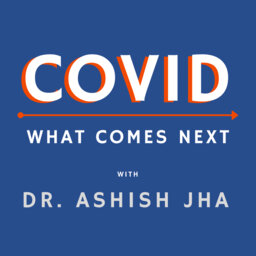Welcome to Episode 32 of “COVID: What comes next,” an exclusive weekly Providence Journal/USA TODAY NETWORK podcast featuring Dr. Ashish Jha, dean of the Brown University School of Public Health and an internationally respected expert on pandemic response and preparedness.
PROVIDENCE – The growing dominance of the deadly Delta variant will pose a grave risk this summer to people who are not fully vaccinated, pandemic expert Dr. Ashish Jha, dean of Brown University’s School of Public Health, said during the latest recording of the “COVID: What Comes Next” podcast.
“If you have not gotten vaccinated, this is a potentially very dangerous time because the Delta variant is spreading,” Jha said. “It's about 6% of infections in the United States right now, doubling every two weeks. If you do the math, in about four to six weeks we'll start getting close to half… By mid-August, it'll be the dominant variant in the United States.”
Jha said that when he assesses risk posed by variants, he examines three factors: ease of contagion, potential for high mortality, and “does it evade immunity from vaccines or prior infections?”
The Delta variant, first detected in India, scores alarmingly on all three, Jha said.
“It is the most contagious variant we have ever seen in this pandemic and that's going to be a huge problem,” Jha said. “Second, it does look like it's a bit more deadly than other variants. And there is some evidence that it has more ‘immune escape’ as well. So, it may be one of the first sort of true triple threats.”
Bottom line?
“If you have not started getting vaccinated, it's time to start,” Jha said.
“Now here's the good news on the Delta variant,” Jha added. “If you've gotten two shots of the mRNA vaccines -- Pfizer or Moderna -- you've got 90% protection against the Delta variant. That is amazing. Thank goodness.”
As for the single-shot vaccine available now across the U.S., Jha said “I think the Johnson & Johnson data will come in the same. We just don't have as much data. But if you got the J&J vaccine, don't freak out. You'll have almost certainly have very good protection.”
On another topic, Jha responded to recent reports in science publications Nature and BioRxiv that once acquired, immunity to COVID-10 is long-lasting – perhaps even as long as a lifetime.
“I don't think lifetime,” Jha said. “I'd love it if our vaccines lasted a lifetime and then we're just good to go forever. I'd be surprised. But it does really push back against this narrative that some people have been saying that we're going to need boosters in six months. I don't see us needing boosters in six months.
“And if immunity is long-lived from a previous infection or from two doses of an mRNA vaccine or a Johnson & Johnson vaccine, I can easily imagine going at least a year and maybe even a couple of years without needing a booster.”
Jha applauded recently reported results of clinical trials of the Novavax vaccine showing a 90.4% overall effectiveness, nearly as good as Pfizer's and Moderna's, and a 100% efficacy in preventing moderate or severe disease.
But with ample supplies of Pfizer, Moderna and J&J in the U.S., Jha envisions the vaccine playing a critical role elsewhere on the planet.
“I am thrilled beyond belief,” Jha said. “Because if things go well, they are on track to make as many as 1 billion doses by the end of the calendar year. That would be very helpful for the world. So as a global vaccination strategy, Novavax could end up being a really, really important player.”
Jha also answered two audience questions: “Would you take a baby or toddler under two, who cannot wear a mask, to a grocery store?” and “Would you take a baby or toddler under two, who cannot wear a mask, on a plane?”
Jha said in many instances, a two-year-old would be safe in a grocery store or on a plane. But his “caveat” was that geography must be considered, given the uneven status of the pandemic in different states and regions. And he said as the summer unfolds, the situation could change, especially in light of the Delta variant.
Recorded weekly since October, the “COVID: What Comes Next” podcast, available exclusively from The Providence Journal and the USA TODAY NETWORK, is now being produced less frequently. This is the 32nd episode.
This podcast is hosted by G. Wayne Miller, health reporter for The Providence Journal.
 COVID: What comes next - With Dr. Ashish Jha
COVID: What comes next - With Dr. Ashish Jha


